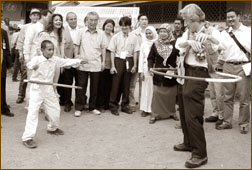|
DAILY NEWS ONLINE |
|
|
|
OTHER EDITIONS |
|
|
|
|
|
|
|
|
|
OTHER LINKS |
|
|
|
|
|
|
 |
|
The world's poor need to learn the lessons of history
|
|
|
To begin with, the very convening of the summit of the African and Asian leaders in Jakarta over the weekend proved that at least from the point of view of the majority of developing countries, the issues of the early years of the new millennium are identical to those of the Sixties.
In a very vital sense, for these states, the majority of whom remain in the Third World, nothing has changed in terms of the prospects of economic development, from those early Cold War years of the Fifties and Sixties when it was conceived as advantageous for the newly decolonized poor of Asia and Africa to raise an independent voice and presence in global politics.
As known, this led to the historic Bandung meet of 1955 and the subsequent launching of the Non Aligned Movement, which gave the poor of the world, a distinct political identity.
How the NAM fared in the Cold War years in now well known. The honest truth is that nothing particularly substantial was achieved by NAM because of a lack of commitment on its part to united, decisive and disinterested action to achieve its core objectives.
It was very often a case of even key members of NAM tying themselves to either of the rival, Cold War power blocs and speaking hypocritically of being nonaligned in world politics. Some even joined superpower-sponsored military alliances - South Asia not being an exception.
Eventually, NAM summits came to be described "talk shops" by particularly sections of the Western media and eventually NAM came to be derided by the same quarters as a spent force. Particularly in the immediate post Cold War years of the early Nineties, NAM was seen by many as a lost cause.
While these interpretations of how NAM was developing were open to question, the fact that nothing very substantial was achieved by the Movement in terms of its founding ideals, seemed to prove its critics right.
The coming together in Jakarta of principal Asian and African countries, however, out of what seems to be a continuing commonality of interests, indicates that the tables have been turned in this debate.
The economic compulsions of the Sixties, for instance, which compelled NAM and its allies in the UN system, such as UNCTAD, and the Group of '77, to campaign for a New International Economic Order, are apparently continuing to be present in this age of economic globalization.
For one, the global economy is proving a great divider, with the gulf widening between the top economic powers and the majority of Third World states, which are proving increasingly poor. Besides, the majority of developing countries are proving incapable of negotiating the pressures of the new global economy.
Therefore, as far as the majority of developing countries are concerned, the challenges of the early NAM years remain and this is the reason why a closing of ranks between the African and Asian continents is seen to be necessary.
One could agree with Indian Premier Manmohan Singh that we need to revitalize NAM to "make it a vehicle for rapid social and economic transformation and emancipation of our lives".
However, this time round, the world's poor need to learn the relevant lessons from their past if they are to bring a measure of material relief to their masses.
They will need to charter an independent course in global politics and strive for a measure of cultural autonomy if their core aims are to be achieved. NAM would need to realize, in particular, that economic, political and cultural independence reinforce each other.
|
|
![[Asia watch]](Asia%20Watch.jpg)





